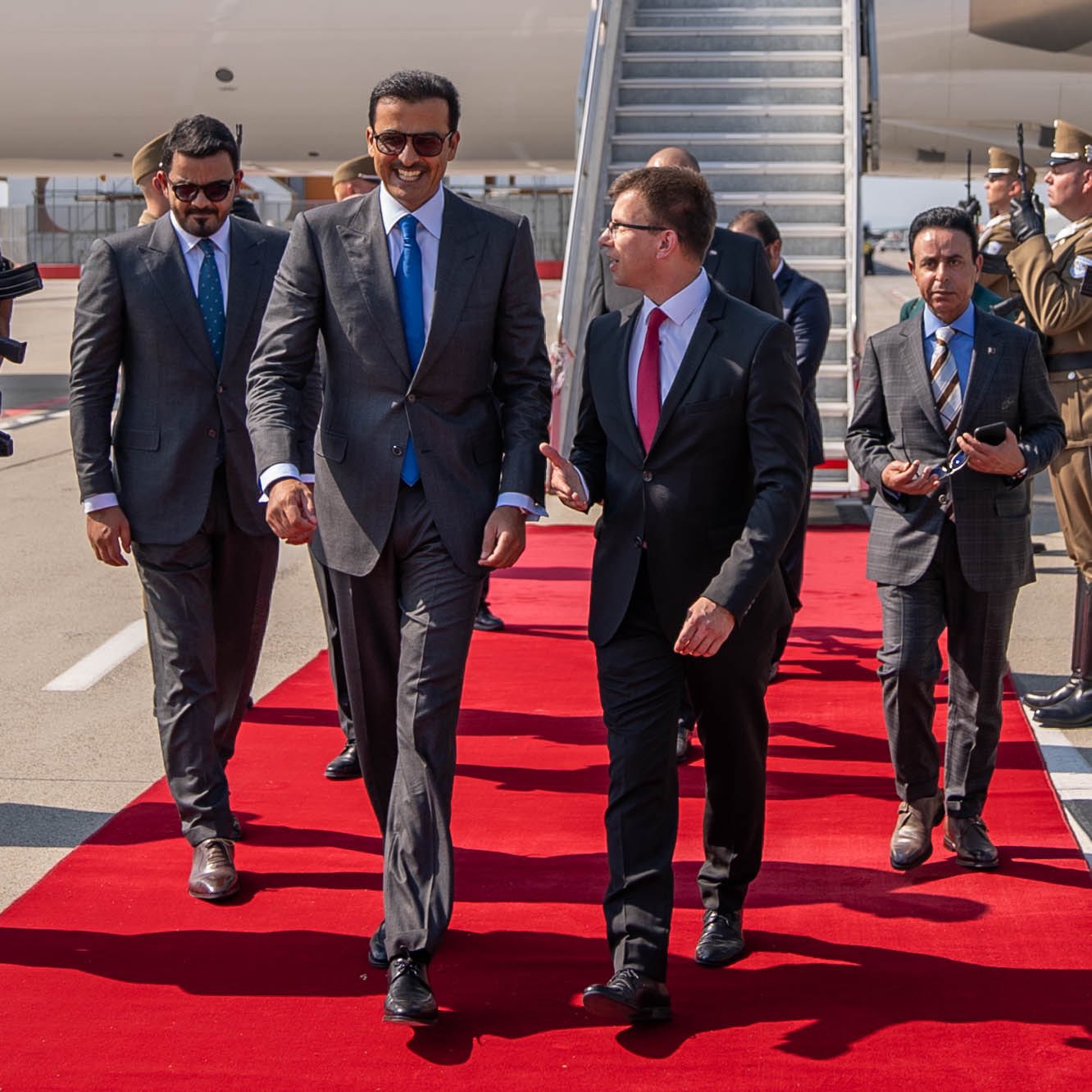Hungary has also been among the countries vocally supporting the exemption of Qataris from the Schengen visa.
Qatar’s Amir Sheikh Tamim bin Hamad Al Thani landed in Hungary on Sunday for an official visit to the European country, where high-level meetings are expected to centre on energy.
“Upon his arrival at Budapest International Airport, His Highness and the accompanying delegation were received by HE Hungarian Minister of Economic Development Marton Nagy, HE Abdullah bin Falah Al Dosari, the State Ambassador to Hungary, HE Frans Corum, Hungarian Ambassador to the State, and members of the Qatari embassy,” the Amiri Diwan confirmed in a statement on Sunday.
The Qatari leader’s visit to Budapest comes in response to an invitation from Hungarian President Katalin Novak, the Amiri Diwan said in a statement ahead of the visit.
On Friday, Hungarian Foreign Minister Peter Szijjarto confirmed that Doha and Budapest have reached “a political agreement” on liquified natural gas (LNG), with supplies set to kickstart in 2027.
“We have reached a political agreement, which is now followed by talks between energy companies Qatargas and Hungary’s MVM to determine the quantity, pace and shipment route of the supplied gas to Hungary from 2027,” Szijjarto told the press, as quoted by Reuters, without disclosing details on the deal.
Last year, European countries reached out to Qatar in a bid to ditch their heavy reliance on Russian gas as Moscow launched an invasion on Ukraine.
Europe previously received 40% of its gas supplies from Moscow, and almost a third of the shipments passed through Ukraine before tensions caused a drop in numbers.
Meanwhile, Hungary receives 4.5 billion cubic metres (bcm) of gas per year through Bulgaria and Serbia as part of a 15-year deal it inked with Russia in 2021.
Szijjarto previously stressed that agreements with the Gulf countries on oil and gas supply to Hungary do not mean the abandonment of contracts with Russia, but are rather aimed at diversification.
The Hungarian foreign minister’s statements came months after Prime Minister Viktor Orban said his country sought to purchase LNG from the Gulf energy giant after 2026. Orban had revealed in May that official talks were still ongoing at the time.
“Over the past year, we have learned that Qatar is a country of key importance for Europe. The European economy has made up for a significant part of the missing Russian gas with LNG coming from here… We agreed on energy cooperation, we will also buy gas from here – it is always better to stand on several legs than on one,” Orban told Bloomberg at the time.
Meanwhile in May, Hungary previously welcomed Qatari investors as strategic partners in the purchase of Budapest Airport, according to reports. The prime minister at the time suggested Qatari investors were considering taking part in a deal to buy the airport facility.
Visa exemption
Hungary is also among a list of countries that have vocally supported the exemption of Qataris from the Schengen visa.
In May, prime minister Orban voiced Hungary’s “strong support” for the decision, the official told Qatar’s news agency (QNA).
During the interview with, Orban said a visa exemption was discussed during a round of political consultations between Qatar and Hungary in March.
“He explained that they [March meetings] dealt with two issues, namely the preparation for his (current) visit to the State of Qatar, and the issue of exempting Qataris from the Schengen visa, which, Hungary – as a member of the European Union, strongly supports,” QNA reported.
In April last year, the European Commission proposed an entry visa exemption for Qatari and Kuwaiti citizens travelling to its member states for up to 90 days. The move would see the two Gulf states join the UAE, which was added to the visa-free regime in 2014.
The decision is expected to be applicable to all EU member states except for Ireland. Other Schengen associated countries that are not subject to the visa waiver include Iceland, Liechtenstein, Norway and Switzerland.
In June last year, the Council of the European Union said the move to negotiate such a mandate was approved by the Permanent Representatives Committee (Coreper), SchengenVisaInfo.com said at the time.
The last update on Qatari citizens’ exemption for Schengen visa came on 2 December, when the European Parliament’s Committee on Civil Liberties, Justice, and Home Affairs (LIBE) approved the proposal.







